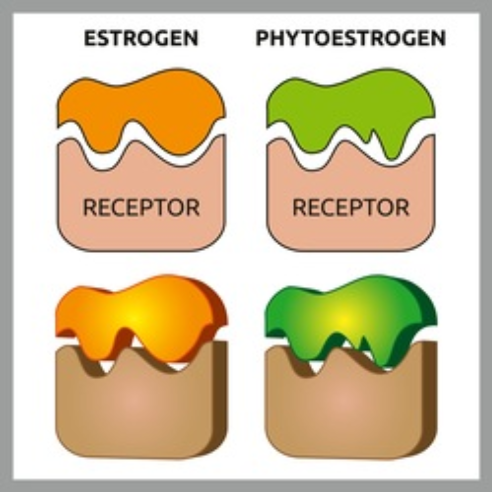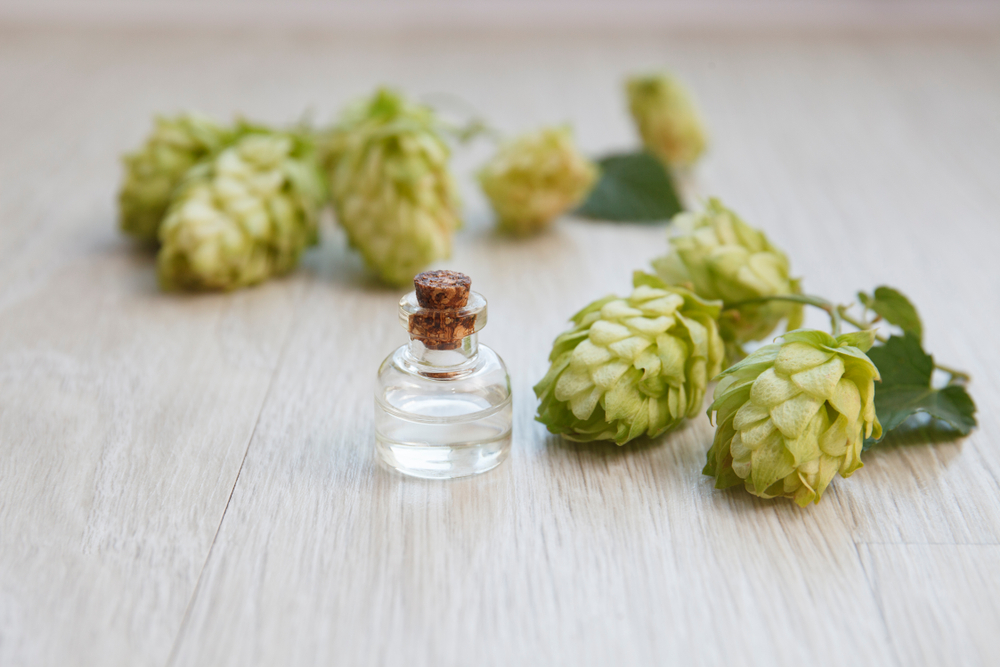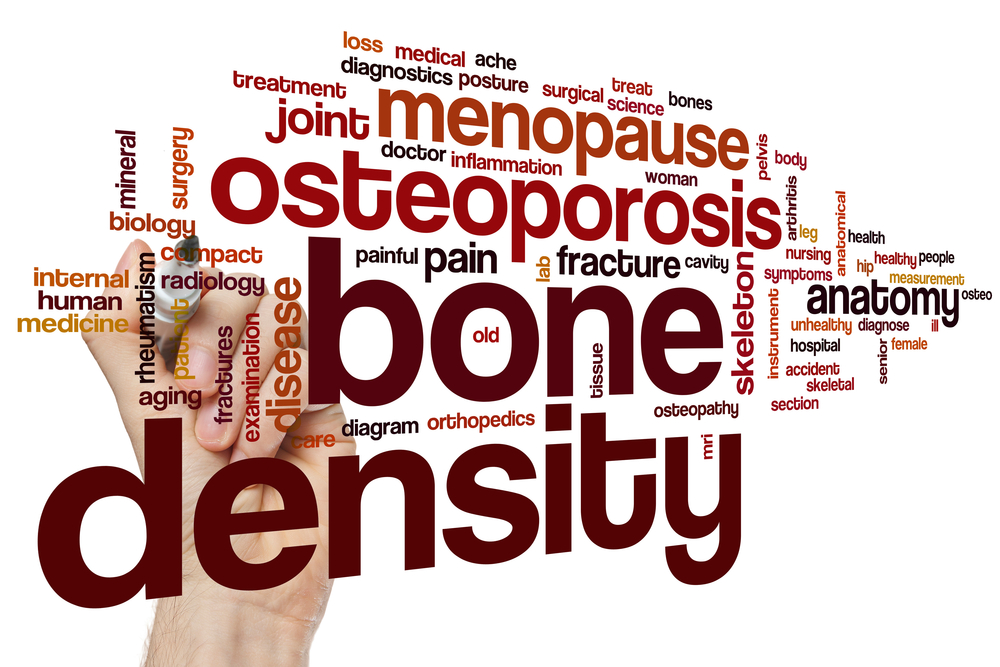There is a direct relationship between the lack of oestrogen after menopause and the development of osteoporosis. Fortunately, there are steps you can take to prevent osteoporosis, such as a healthy lifestyle, limiting processed food and soft drinks and moderate exercise and treatments are available to slow the rate of bone loss if you have osteoporosis. For instance weight-bearing exercises (which make your muscles work against gravity), Calcium and vitamin D supplements and a number of prescribed medications. Whilst also scientists have started to study the benefits of a group of plant hormones known as phytoestrogens and they can support bone health following the menopause.
What is osteoporosis?
Osteoporosis is a disease that weakens bones, increasing the risk of sudden and unexpected fractures. Literally meaning “porous bone,” it results in an increased loss of bone mass and strength. The disease often progresses without any symptoms or pain. Generally, osteoporosis is not discovered until weakened bones cause painful fractures (bone breakage), often in the back (causing chronic back pain) or hips.
What causes osteoporosis?
Though we do not know the exact cause of osteoporosis, we do know how the disease develops. Your bones are made of living, growing tissue. An outer shell of cortical or dense bone wraps trabecular bone, a sponge-like bone. When a bone is weakened by osteoporosis, the “holes” in the “sponge” grow larger and more numerous, weakening the inside of the bone.
Until about age 30, a person normally builds more bone than he or she loses. After age 35, bone breakdown overtakes bone buildup, which causes a gradual loss of bone mass. Once this loss of bone reaches a certain point, a person has osteoporosis.
How is osteoporosis related to menopause?
There is a direct relationship between the lack of estrogen after menopause and the development of osteoporosis. Oestrogen actions on bone are complex. The major physiological effect of estrogen is to inhibit bone resorption. Bone cells have two kinds of intracellular steroid receptors for estrogen. When estrogen binds to the receptors, various genes become active.
After menopause, bone resorption (breakdown) overtakes the building of new bone. Early menopause (before age 45) and any long phases in which the woman has low hormone levels and no or infrequent menstrual periods can cause loss of bone mass.
Phytoestrogens
Scientists have started to study the benefits of a group of plant hormones known as phytoestrogens. These hormones occur naturally in certain foods such as soya (fermented is best), hops, dandelion, red clover, sage, alfalfa and flaxseeds. When taken they provide a natural weak oestrogen like impact and latch on to oestrogen receptors on the body. So, in doing so help to balance hormones and thus support menopausal symptoms.

Soy has long been regarded as the best dietary source of phyto-oestrogens available. It seems now though that there may well be another plant source to take its place. Recent studies have now found 8-prenylnaringenin, the oestrogenic compound in hops, to be the most potent natural phyto-oestrogen available.
The History of Hops
The female flowers (cones) of hops (humulus lupulus) have been used for centuries as a preservative and as a flavouring agent in beer. In times when hops were picked by hand, it became increasingly obvious that menstrual disturbances among female pickers were becoming more and more common. This observation led to the speculation that hops may have oestrogenic activity. Over the years that followed, hop baths were used for the treatment of gynaecological disorders and hop extracts were reported to be effective in reducing hot flushes in menopausal women. Scientific studies results on the oestrogenic activity of hops date back as far as 1953 were contradictory, although in 1999 a scientifically sound study finally identified the compound in hops responsible for its oestrogenic activity as 8- prenylnaringenin.

Strongest Binding Affinity for Oestrogen Receptors
In relation to other phyto-oestrogens, 8-prenylnaringenin also showed the strongest relative binding affinity for alpha and beta oestrogen receptors. This strong binding affinity means that 8- prenylnaringenin has unusually strong bio-activity as an oestrogenic compound and has strong potential for therapeutic application in oestrogen deficient conditions such as the menopause.
Menopausal Symptom Relief
Potent oestrogenic activity from a natural phyto-oestrogen source is welcome news for women suffering with menopausal symptoms. Lowered oestrogen levels during the menopause are known to be a major contributory factor in a multitude of unwanted symptoms
Positive Results for Bone Metabolism
As discussed above oestrogen has a significant role to play in healthy bone metabolism, and whilst lowered oestrogen levels are not the only factor contributing to an increased risk of osteoporosis following the menopause, they certainly need to be considered. Bones are continuously being renewed and maintained via a dynamic process. In optimal bone health, an equilibrium is maintained between bone disintegration (bone resorption) and bone formation. During the menopause there is a strongly reduced production of oestrogen. Since oestrogen has a large part to play in bone formation, a disequilibrium between bone disintegration and bone formation appears. Osteoporosis is characterised by a general loss of total bone mass and involves a highly increased risk of fractures. 8-prenylnaringenin, the oestrogenic compound in hops, has been shown in vivo to function as an oestrogen agonist. This is highly significant for menopausal women who are at higher risk of osteoporosis and points toward hops being a highly effective supplement to lower this risk.
So what does this mean?
Although not conclusive, including phytoestrogens in your daily food intake, may be beneficial to supporting menopausal symptoms. With regards to hops I am not implying you should get down to the pub for your daily quote of hoppy beer. There are supplements which contain hops that are specifically designed to support menopausal symptoms. So do your research or discuss with a qualified registered health care professional.
